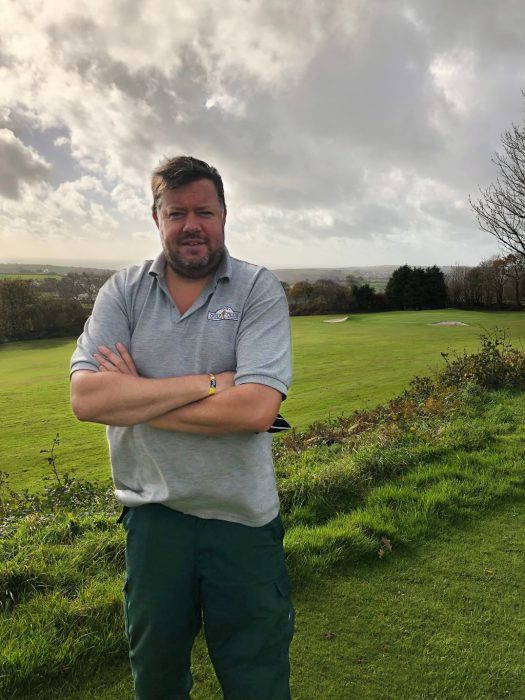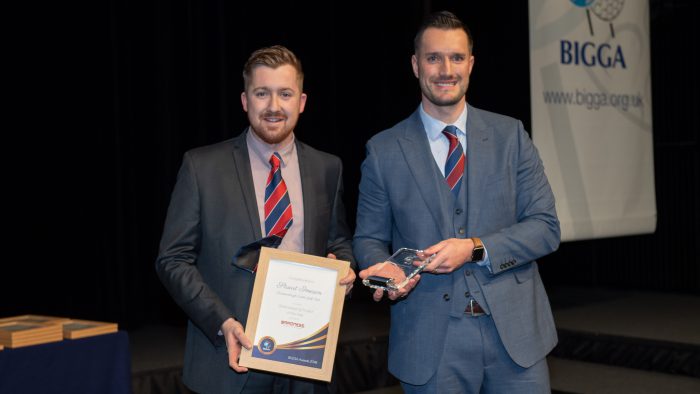Meet the greenkeepers who are also their golf clubs’ managers
Looe Golf Club in Cornwall and Dunstanburgh Castle in Northumbria are both managed by their greenkeepers. First, here Mat Edwards, from the Harry Vardon-designed Looe Golf Club in Cornwall, details what an average day at the club for him is like.
What time do you arrive at the club?
Our working hours change throughout the year dependent on daylight hours. In the summer I get in between 6:00 and 6:15am, but if there are competitions on at the weekend, we will sometimes start any time after 5:00am to cut ahead of the first group of golfers. In the winter, when days are at their shortest, we start at 7:30am.
Can you describe your morning routine?
We will open up all of the sheds, have a quick cup of coffee and arrange the jobs for the day, depending on the tee time book and the weather for the day ahead.
How many people are there in your greenkeeping team and is it a fair number for your collective workload?
The most we have at one time is four, although more often than not it is two or three as the club job-shares, meaning that occasionally we have to cover shifts in the clubhouse. When everyone is fit it works out, however if someone phones in sick or they are on holiday then it becomes very stretched. I think every club would always wish for extra green staff as there are always jobs to do.
Do you share tasks?
With such a small workforce, it’s impossible not to share tasks. Everyone knows how to do every task, except for spraying, which is only done by myself. Also, due to a staffing reshuffle, I have now been made managing director of Looe Golf Club, so my workload has now increased significantly.

Mat Edwards
How do you motivate your colleagues?
We have all known each other for a relatively long time thanks to being members at Looe Golf Club since junior level, so we get on very well, which creates a good working atmosphere. We are always ‘winding each other up’!
We all play golf as well, both socially and for the club (with one lad playing for Cornwall), which also helps when setting up the course.
What aspects / functions of your job gives you the greatest satisfaction?
Getting the course completely cut and prepared by Friday, ready for the usually-busy weekend of play is very satisfying. All of our members really appreciate the work we have put in over the last few years to greatly improve the playability and appearance of all areas of the course. For least: Seeing unrepaired pitch marks, divots and unraked bunkers after a shot has been played is highly frustrating, when they know how much work we put into achieving the standard players now expect. Also, constantly clearing leaves and pine needles in the autumn is very time consuming.
Have you attended any courses recently?
I am relatively new to the industry having only started at Looe Golf Club in 2014. Personally, I haven’t attended any courses since acquiring my spraying licence in 2016, although I do attend the occasional seminar. Over the last two years we have sent a couple of our staff on chainsaw courses which has worked very well, as we have lots of trees around the course. Being built on one of the highest points in Cornwall, we are very exposed to the elements so we often have damage to attend to.
Do you have a feeding programme for your fairways?
Our budget doesn’t allow for fairway feeding, only greens, tees and approaches at the moment. With many products being taken off the market due to new legislation, a lot of courses now prefer the use of natural products like seaweed and other bio-stimulants to maintain a healthy sward. Keeping an eye on nutritional inputs is very important as over-encouraging growth can lead to disease, while managing the height of cut around times of high turf stress is also beneficial. We have a very good relationship with Headland Amenity and our local rep, Richard Shapland, lives only 20 minutes away. He is always on hand and willing to give us any advice or information on products and procedures. Headland’s C-Complex fertilisers are, in my opinion, the best on the market for use around greens’ renovation time.
How would you improve the greenkeeping industry?
In my opinion, investing in training is key for any new individuals looking to start a career in the industry. Gaining as much knowledge as possible is a must, especially as legislations change and new rules are introduced by The R&A.
What advice would you give to a young greenkeeper starting out today?
Get as much training as possible and pay attention to those you work with, whilst listening to all instructions. Getting something wrong on the course could be disastrous to the surface and if it’s working with large machinery, could be potentially dangerous.
How do you spend your leisure time?
In the last year myself and my better half have purchased our first house, so all of our spare time is spent working on that. Given the chance (and time) I might pop out for nine holes!
Story 2: Manager / greenkeeper Stuart Imeson wins award
The general manager – and head greenkeeper – at Dunstanburgh Castle in Northumbria, Stuart Imeson, 28, has won an industry award.
He won BIGGA’s ‘Greenkeeping Project of the Year’ sponsored by Baroness.
In addition to embracing his new managerial role at the golf club in the last year, Stuart has continued to provide excellent educational opportunities for greenkeepers through his ‘Bunker Camps’, which were a sell-out in 2018 as greenkeepers from across Europe came together to take part.

Stuart (left) with Adam Butler of Baroness
The camps see volunteers head to Dunstanburgh Castle to participate in the construction of revetted bunkers over a two-week period, with educational seminars and workshops taking place alongside the practical greenkeeping. More than 250 people have now been involved since the start of the bunker camp and education days.















Let me tell You a sad story ! There are no comments yet, but You can be first one to comment this article.
Write a comment